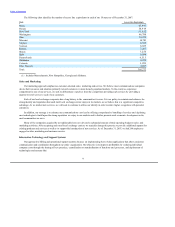FairPoint Communications 2007 Annual Report Download - page 21
Download and view the complete annual report
Please find page 21 of the 2007 FairPoint Communications annual report below. You can navigate through the pages in the report by either clicking on the pages listed below, or by using the keyword search tool below to find specific information within the annual report.
Table of Contents
that Verizon spent in expanding its DSL network in Maine in excess of the $1.9 million previously anticipated for that purposes (which
amounts would otherwise have been offset against Spinco’s required working capital at closing of the merger).
We have agreed to the appointment of an independent third-party monitor for the cutover process contemplated by the TSA. The
monitor will consult with representatives of the VDPS, the MPUC and the NHPUC. The monitor will evaluate and approve our testing
and cutover readiness process to evaluate our readiness to support our operations after the cutover from the systems that will be provided
by the Verizon Group during the period of the TSA. Any delay caused by the evaluation and approval process would result in the
payment of monthly fees to Verizon for an additional period and may limit our ability to introduce new services.
There can be no assurance that the orders issued by state regulatory authorities in Vermont and New Hampshire approving the
transactions will not be appealed or that third parties will not seek reconsideration of these orders. The period for appeals in Maine has
expired.
The Northern New England business in Maine currently operates under an AFOR implemented by the MPUC. The AFOR provides
for the capping of rates for basic local exchange services and allows pricing flexibility for other services, including intrastate long
distance, optional services and bundled packages. Our existing telephone companies in Maine currently operate under traditional rate of
return regulation and have limited forms of pricing flexibility. All telephone companies in Maine are required to establish intrastate access
rates which do not exceed their interstate access rates as they existed on January 1, 2003. Certain intrastate wholesale services are also
subject to tariffing requirements of the MPUC. The AFOR also includes a service quality indexing, or SQI, requirement for the Northern
New England business, which establishes benchmarks for certain performance categories and imposes penalties for the failure to meet the
benchmarks. In 2006, the MPUC established temporary service quality benchmarks for measuring service quality improvements by our
existing telephone companies, which have been satisfied. In addition to the regulation of rates and service, telephone companies are
generally subject to regulation by the MPUC in other areas, including transactions with affiliates, financing and reorganizations. In June
2001, the MPUC ordered the continuation of the AFOR applicable to the Northern New England business’s operations in Maine for a
second five-year term. This was appealed by the Maine Office of the Public Advocate and after proceedings the MPUC’s order approved a
final settlement for these proceedings subject to the closing of the transactions. Under the terms of the order, among other things, we
would reduce monthly basic exchange rates effective as of August 1, 2008 by an amount designed to decrease revenues by $1.5 million
per month. The new AFOR would cap basic exchange rates in Maine at that level for five years after August 1, 2008.
In orders issued in 2004 and 2005, the MPUC ruled that it had the authority under federal law to regulate compliance with certain
conditions that the Northern New England business must satisfy to sell long-distance services, and in particular to define the elements
that the Northern New England business must provide on a wholesale basis to competitive carriers under Section 271 of the
Communications Act. The MPUC ruled that it had the authority to set rates for Section 271 elements and interpreted Section 271 to
require the Northern New England business to provide access to elements that the FCC had held are not required to be proved as
unbundled network elements under Section 251 of the Communications Act. Verizon New England challenged the ruling in the
U.S. District Court of Maine. Following an unfavorable ruling, Verizon New England appealed to the First Circuit Court of Appeals. The
First Circuit vacated the District Court’s decision and held that the MPUC has no such authority. The court remanded the matter for
further proceedings by the District Court. Once these matters are resolved, the court’s decision is expected to reduce to some extent our
wholesale service obligations.
19
























